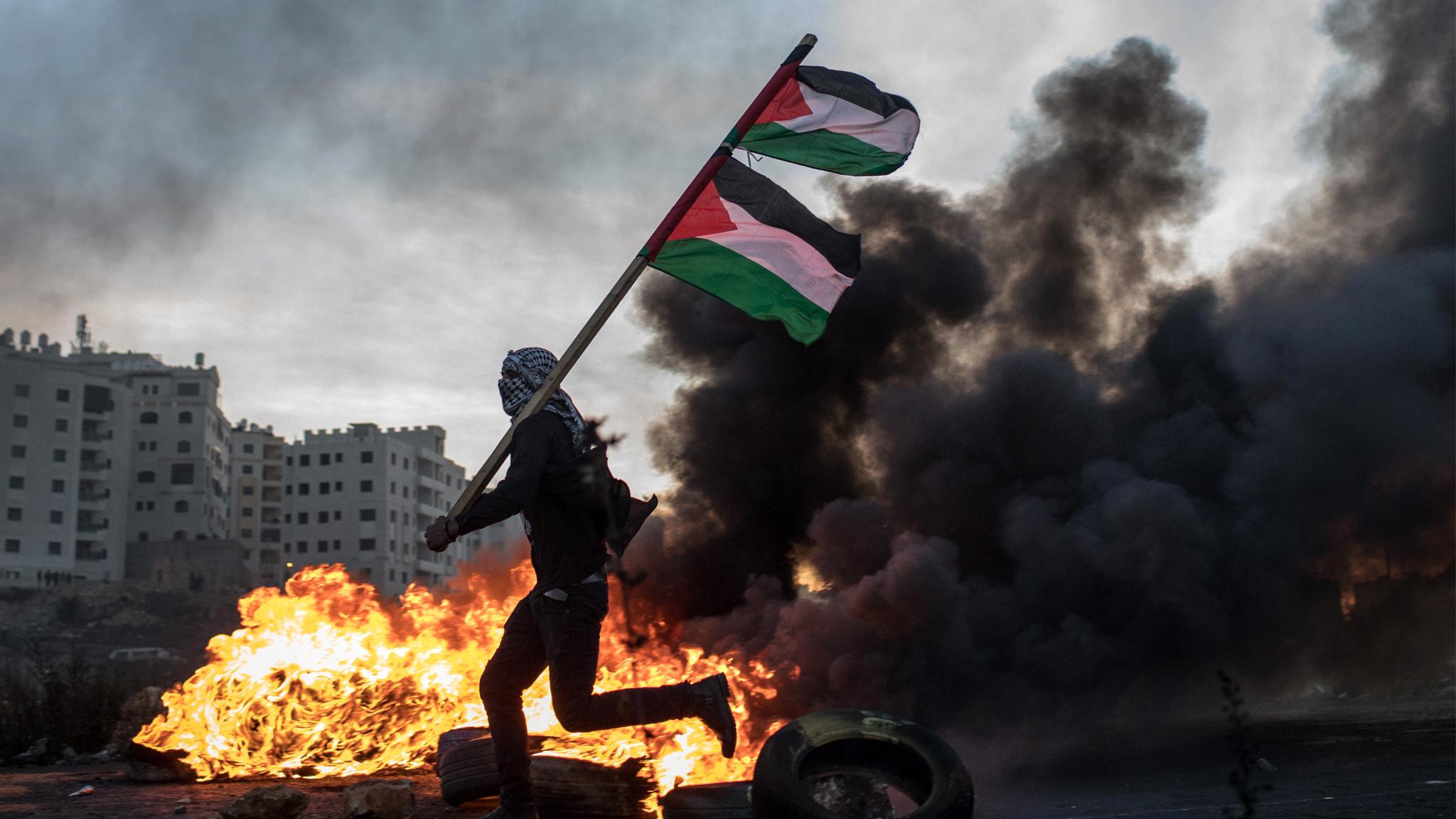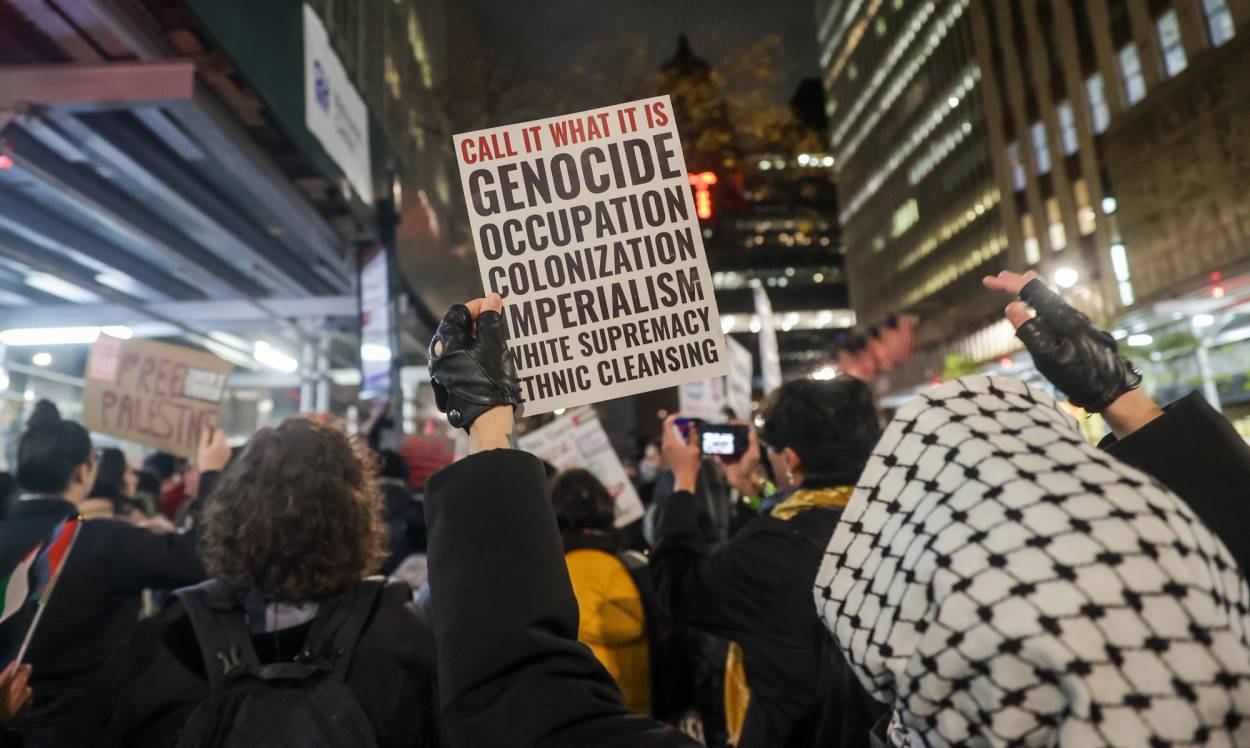 Source: Chris McGrath / Getty
Source: Chris McGrath / Getty
 Nieświęty sojusz między “przebudzeniem” i barbarzyństwem
Nieświęty sojusz między “przebudzeniem” i barbarzyństwem
Brendan O’Neill
Tłumaczenie: Małgorzata Koraszewska
Spinoza był wściekły. Zaplanował wizytę na miejscu barbarzyńskich wyczynów tłumu i zorganizowanie jednoosobowego protestu. (Pomyśl o Grecie Thunberg, ale oświeconej.) Przygotował sobie plakat. Jego gospodarz powstrzymał go jednak, bojąc się, że i on zostanie zabity przez tłum. I tak historii odmówiono widoku jednego z naszych wielkich filozofów organizującego samotny, wściekły protest. Co głosił jego prowizoryczny plakat? Były na nim dwa słowa. „Ultimi barbarorum”. Tłumaczenie z grubsza brzmi: „Jesteście największymi z barbarzyńców”.
W tym roku bardziej niż w jakimkolwiek innym zrozumiałem, co czuł Spinoza. W 2023 roku wielokrotnie kusiło mnie, by udać się do wielu miejsc z plakatem z napisem „Ultimi barbarorum”. Do kibuców południowego Izraela po faszystowskiej dzikości Hamasu wobec Żydów 7 października. Do Uniwersytetu George’a Washingtona po tym, jak studenci wyświetlili na ścianie budynku biblioteki słowa „Chwała naszym męczennikom”: młodzi Amerykanie o niewyobrażalnych przywilejach, czerpiący przyjemność z rzezi Żydów. Do pięknego, zielonego kampusu Columbia w Nowym Jorku, gdzie studenci planowali zorganizować spotkanie na temat poruszającej „kontrofensywy” Hamasu. Na te „propalestyńskie” marsze w Londynie, podczas których zdradziecka moralnie klasa średnia maszerowała wraz z typami przebranymi za terrorystów i ekstremistów Hamasu, skandujących wezwania do jeszcze większej rzezi w Izraelu: „Dżihad, dżihad, dżihad!”
Na Uniwersytet Nowojorski, gdzie studenci krzyczeli: „Nie chcemy żadnego państwa żydowskiego / Chcemy wszystkiego”: wezwanie wypasionych, by Hamas dokończył ludobójcze działo eliminacji Żydów na Bliskim Wschodzie. Na ulice Manhattanu, gdzie protestujący krzyczeli: „Wstydź się!” do Izraelki, której córka została porwana i brutalnie torturowana przez Hamas. Napastowanie ofiar rasistowskiego terroru – to doły moralne nawet dla stukniętych „przebudzonych”. Szczerze mówiąc, do każdego zgromadzenia politycznie pokręconych przedstawicieli pokolenia Z, po tym jak sondaże wykazały, że ogromna ich liczba postrzega Żydów jako „klasę ciemiężycieli” i wierzy, że pogrom Hamasu był „usprawiedliwiony”. Oraz do Opery w Sydney, gdzie radykalni islamiści skandowali „Żydzi do gazu” i „Jebać Żydów” zaledwie kilka dni po zamordowaniu Żydów przez Hamas. Parady w stylu nazistowskim, niepohamowana radość z ludobójczej przemocy na ulicach zachodniego miasta.
W każdym z tych miejsc chciałam powiedzieć „Ultimi barbarorum”. Wytknąć palcem zarówno barbarzyństwo, jak i jego intelektualnych apologetów. Wyrazić odrazę w stylu Spinozy do tych nowych wrogów zachodniej cywilizacji. Nie oszukujmy się, tacy właśnie są. Od Hamasu po radykalnych islamistów w Europie, którzy czują się zainspirowani przez Hamas, po uprzywilejowanych synów i córki Zachodu, którzy usprawiedliwiają Hamas – oni wszyscy w 2023 roku udowodnili, że są przeciwnikami prawdy, kultury i rozumu. Z pewnością nikt teraz nie zaprzeczy, że cywilizacja zachodnia jest atakowana na dwóch frontach: z zewnątrz i od wewnątrz?
Zachodnia lewica burżuazyjna uwielbia bawić się w marksistów, często cytując wielką Różę Luksemburg: „Socjalizm albo barbarzyństwo!” W tym roku odkryliśmy, po której stronie tego starcia stoją – nie jest to strona Róży Luksemburg. Apologetyka Hamasu w kręgach uprzywilejowanych jest zdumiewająca. Zaprzeczają, bagatelizują lub wręcz usprawiedliwiają bestialską przemoc Hamasu wobec Żydów. „Dzień świętowania” – tak pewien wykształcony w prywatnych szkołach, udający radykała człowiek w Wielkiej Brytanii opisał rasistowską rzeź, która miała miejsce 7 października. Ta sympatia dla barbarzyństwa, ta otwartość na akty oszałamiającej dehumanizacji wykracza poza izraelofobię. Mówi to nie tylko o bezmyślnej nienawiści do Izraela, która od lat szerzy się w kręgach poprawnie myślących.
Dotyka także czegoś głębszego niż plaga polityki tożsamości, chociaż polityka ta bez wątpienia kształtuje infantylne, gorące przekonanie, że Żydzi są permanentnymi prześladowcami, a Palestyńczycy wiecznymi ofiarami. Nie, współczucie okazywane przez „przebudzonych” ludzi Zachodu dla apokaliptycznej przemocy Hamasu ukazuje moralne pokrewieństwo między tymi dwiema częściami globalnego społeczeństwa. Obnaża ich wspólną pogardę dla zachodniej cywilizacji, wspólną obojętność na ludzkie cierpienie i wspólną odrazę do wolności.
Skutki wydarzeń z 7 października wyciągnęły na jaw kryzys cywilizacji zachodniej, który narastał od dziesięcioleci. Potwierdziło to, że kiedy socjalizujecie młodych w systemie odrazy do własnej cywilizacji, nie tylko czynicie ich obojętnymi na zagrożenia, przed którymi stoi ta cywilizacja, ale także sprawiacie, że z radością przyjmą takie groźby, powitają je jako niezbędną moralną korektę naszej własnej pychy i niewłaściwie ulokowanej wyjątkowości.
Wychowawszy młodzież, by postrzegała Zachód jako jednostkę rasistowską; bała się Ameryki i Wielkiej Brytanii jako narodów zrodzonych w grzechach niewolnictwa i imperializmu; by „dekolonizowała” własną naukę tych aroganckich białych ludzi Oświecenia; wystrzegała się nauki jako zachodniego konceptu, który neguje bardziej tubylcze sposoby poznania; i wątpiła w istnienie samej prawdy, nie możemy być teraz zaszokowani faktem, że są tak bezczelni w związku z brutalnym atakiem na ten nie do opisania okropny Zachód. W tym przypadku rasistowski atak Hamasu na ludność państwa, które na Bliskim Wschodzie jest postrzegane jako ucieleśnienie zachodnich wartości. Dla wielu współczesnych „cywilizacja zachodnia jest synonimem rasizmu, ucisku i wyzysku”, jak to ujął jeden z naukowców. Dlaczego więc nie uczcić jego brutalnego upokorzenia? Dlaczego nie rozkoszować się poniżeniem tych, którzy cieszą się z jego zdobyczy?
Nie możemy sobie pozwolić na niedocenianie tego, jak znaczący jest fakt, że wielu naszych młodych obywateli sympatyzuje z Hamasem i postrzega Żydów, których Hamas wymordował, jako prześladowców. To musi być moralny przełom dla Zachodu. Zwracając młodych przeciwko cywilizacji, poprowadziliśmy ich w ramiona barbarzyństwa. Straciliśmy ich na rzecz Hamasu.
Nie można już dłużej zaprzeczać nieświętemu małżeństwu ruchu „przebudzenia” i islamizmu. Jeden i drugi gardzi ideą cywilizacji zachodniej. Jeden i drugi wypiera się Oświecenia jako arogancji Zachodu. Jeden i drugi boi się marszu nowoczesności, czy to jako zagrożenia dla Gai, czy szariatu. I jeden, i drugi nienawidzi Żydów. Jedna strona postrzega ich jako świnie i małpy, druga jako klasę ciemiężycieli. Po raz kolejny Żydów zaczęto postrzegać jako ucieleśnienie nowoczesności i dlatego wrogowie nowoczesności, niezależnie od tego, czy są to cywilizacyjni sceptycy z naszych elitarnych uniwersytetów, czy cywilizacyjni napastnicy radykalnego islamu, zwracają się przeciwko nim. Zjadliwie. „Przebudzeni” odczłowieczają ich jako ciemiężycieli, Hamas odczłowiecza ich przemocą. Są to ataki nie tylko na Żydów, ale także na samo cywilizacyjne sumienie.
Obecnie niechętnie mówi się o zderzeniu cywilizacji z barbarzyństwem. Wydaje się to zbyt staroświeckie. A jednak tego zderzenia nie można już dłużej ignorować. Dziś stoimy w obliczu nie tylko zderzenia cywilizacji, ale, co być może ważniejsze, zderzenia w obrębie cywilizacji zachodniej. Z jednej strony ci, którzy porzucili rozum, z drugiej ci z nas, którzy chcą go bronić. Ruch przeciwko barbarorum naszych czasów w 2024 r. nie byłby czymś złym.
Brendan O’Neill – znany brytyjski publicysta i komentator polityczny, wieloletni naczelny redaktor „Spiked” publikujący często w „The Spectator”. W młodości zapalony trockista, członek Rewolucyjnej Partii Komunistycznej i autor artykułów w „Living Marxism”. (Jak się wydaje, z tamtych poglądów została mu wiedza o tym, jak ideologia może odczłowieczać.)
Zawartość publikowanych artykułów i materiałów nie reprezentuje poglądów ani opinii Reunion’68,
ani też webmastera Blogu Reunion’68, chyba ze jest to wyraźnie zaznaczone.
Twoje uwagi, linki, własne artykuły lub wiadomości prześlij na adres:
webmaster@reunion68.com



